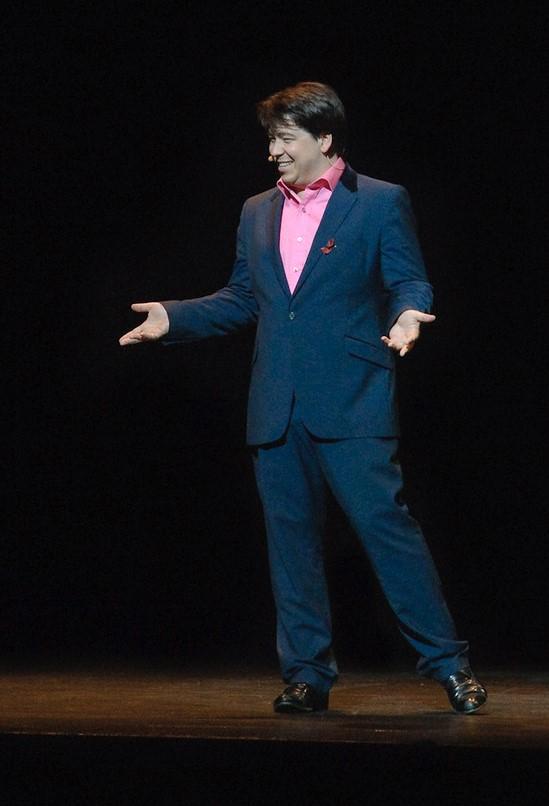Excerpt: Michael McIntyre, Yes Man by Richard Reed

Michael McIntyre is a famous British comedian, writer, and television presenter. He's probably most famous for his stand-up comedy acts, which is what started his career, but the British audience will also know him as a television presenter and participant in numerous comedy panel shows and chat shows.
Before you move on to the text, enjoy this sketch where Michael McIntyre meets the fortune teller Michael McIntyre before the 2020 pandemic lockdown. Do any of the predictions sound familiar?
I’m on the phone trying to arrange a meeting with Michael McIntyre, the highest-grossing comedian in the world, but I can’t: he’s making me laugh too much. The experience, however, is at least answering a question I’ve always asked myself: are professional comedians funny when they’re not on stage? In this case, the answer is: oh yes.
When we finally do meet in person, it continues. Michael starts by noting that I’m talking too loudly for a restaurant – almost as noisily as an American, he adds in a faux-bitchy whisper. He confesses to suffering from what he calls ‘restaurant hush’, the British middle class need to speak quietly when you are somewhere a bit posh.
Surprisingly, for a chat with one of the world’s funniest men, we quickly get into the topic of financial planning: the importance of never spending more than you earn, of avoiding the perils of credit cards and compounding interest. The reason: as a struggling stand-up he spent ten painful years spiralling into debt before making it big. ‘By the time I was thirty my career had gone nowhere and I’d got myself £40,000 in the hole. I was sitting in my room and thought, my life is not my life, I’m renting everything: the flat’s rented, the furniture’s on credit, the TV I’m paying off at Dixons . . . even that video needs to go back to Blockbusters.’
It’s funny material now but was serious back then. The bailiffs were called in. The first time they took his car, then the furniture, then his appliances. On one visit he realised there was a man with a boom microphone accompanying the debt collector. When Michael queried the recording equipment, he explained he was making a documentary about bailiffs for Radio 4. ‘I said, “I can’t be in that,” but then I thought maybe this could be the break I’m looking for, so I started to try and be funny, thinking maybe if I’m on the radio someone will get in touch.’
So what took him from those dire straits to centre stage? A simple but fundamental thing happened: he had Lucas, his first child. According to Michael, comedians get funnier when they become parents, mainly because they have to. For him the effect was instant: the sense of responsibility, the need to provide. ‘I thought I’m going to do whatever it takes to make it before he can speak. I don’t want his first words to be, “Daddy, why is that man taking the video recorder?”’
So the motivation was clear, but how does a comedian actually make themselves funnier?
‘I was crazed with it. I started doing gigs seven nights a week, for less money, for no money, just to keep practising, to get the jokes together, and to get the stage time. I knew if I could get one big laugh, then if I worked hard enough I’d get another and then another.’
Over time he built a twenty-minute set he considered bullet proof (‘I could make twelve people in a room above a pub who weren’t really listening start to cry with laughter’), then he rang up the biggest agent in comedy, got him down to a gig in a small club, and gave the best and most important performance of his life.
When he came off the stage, the agent simply said, ‘You’re a revelation,’ and booked him for his first TV gig on the Royal Variety Performance. And then, boom. Like most overnight successes, it had taken ten years for him to get there.
Getting the stage time, never mind screen time, is somewhat easier now for Michael, as the country’s most in-demand comedian. But he still works the small gig circuit, doing dingy clubs on rainy Tuesday nights whenever he’s crafting new material. And he still remembers how painful it can be when you don’t have the money, when things aren’t working, when the situation is looking pretty hopeless. So he passes on this advice to those at that stage:
‘You somehow need to find a way to believe, to keep going. But it’s not enough to just say to yourself “be confident”, you can’t just BE confident, you have to surround yourself with people who bring the best from you, who will help you, who will help you grow that confidence. I’m like Britain’s Got Talent. I need my three yeses. I need my wife, my mother and my agent to all say, “Yes, that was good.” Then it’s like, all right, that works, I can keep going. I put my success down to that: my wife, my family, my support network. My three yeses.’
This time, he’s not joking.
Copyright © Richard Reed,
Canongate Books.